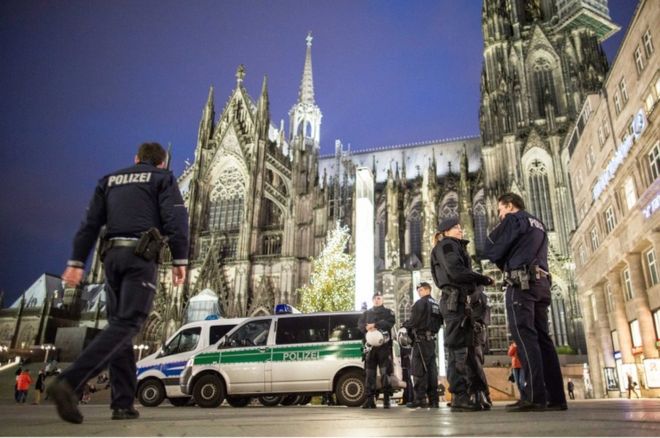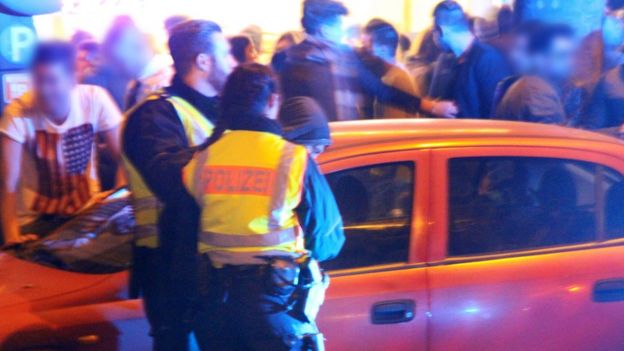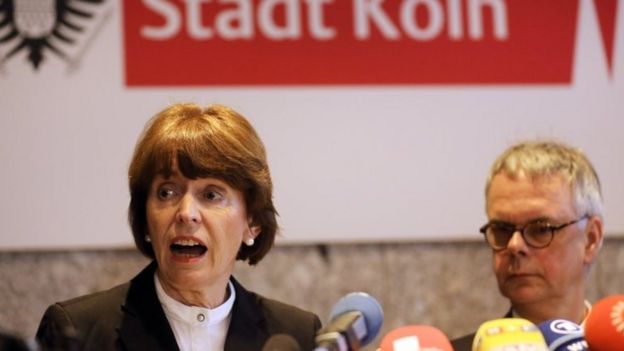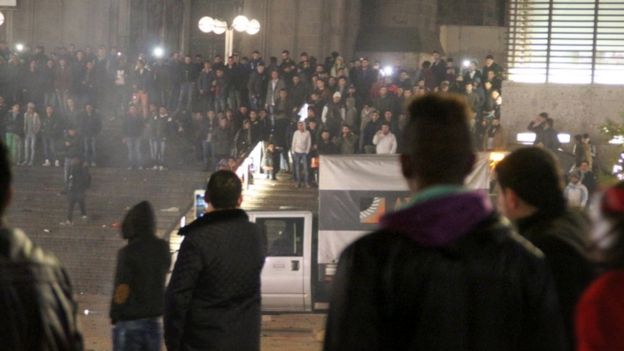
The head of Cologne's police force
is leaving his post "to restore public trust in the police" following
scores of attacks on women in the city on New Year's Eve.
The police's handling of the night's events has been sharply criticised.The violence outside the main railway station has sparked a debate about Germany's open door policy on migrants.
The anti-immigration Pegida group has said it will hold a demonstration in Cologne on Saturday.
Police are expecting around 1,000 people to gather in front of the city's main train station, German media reports say.
Gangs of men described as of North African and Arab appearance were reported to be behind the attacks on New Year's Eve.
A group of about 1,000 had gathered at the station in the western city.
Victims described chaos as dozens of sexual assaults and robberies were carried out with little apparent response from the authorities.

Police did make some arrests in the early hours of New Year's Day
Federal authorities say they have identified 18 asylum-seekers among 31 suspects linked to crimes committed in Cologne on New Year's Eve.
The suspects include nine Algerians, eight Moroccans, four Syrians, five Iranians, two Germans and one each from Iraq, Serbia and the US.
The state interior minister of North Rhine-Westphalia, Ralf Jaeger said on Friday that he had suspended police chief Wolfgang Albers from his duties.
He has been accused of holding back information about the attacks, in particular about the origin of the suspects.
Mr Jaeger said the removal would not affect the investigation into the events of 31 December.
"People rightly want to know what happened on New Year's Eve, who the perpetrators are and how such events can be prevented in future," he said.
Discomfort under the surface :German media reaction
Debating rules on deporting criminals is a distraction, writes Heribert Prantl in the Sueddeutsche Zeitung. The law already provides for the deportation of criminal refugees, he says - he problem is the mistakes made by the police on the night and their inability to enforce the law.Writing in the Frankfurter Allgemeiner Zeitung, Christian Geyer largely agrees. Whether or not Syrians, Afghans and Iraqis with asylum seeker status were among the perpetrators changes nothing in the debate, he writes. The questions for the police and justice system remain the same.
And while Chancellor Merkel's asylum policies are controversial, she doesn't need the help of favourable police reports, he adds.
The federal police is responsible for the station itself but not the area nearby.
Separately, Cologne police are investigating 21 people in connection with the sexual assaults. It is not known how many of these are asylum seekers.
The state police have recorded 170 complaints of crimes, 117 of which involve sexual assault. There were two allegations of rape.
Two men, aged 16 and 23 and apparently of North African origin, arrested overnight on Thursday in connection with the sex attacks, have been released without charge, according to German media.

'Clear signals'
German Chancellor Angela Merkel has condemned the violence, saying Germany should examine whether enough was being done to ensure foreigners convicted of crimes in the country are deported.She said "clear signals" had to be sent to those not prepared to abide by German law.
In a separate case, police have arrested four Syrians, aged between 14 and 21, over the suspected gang rape of two teenage girls in the southern German town of Weil am Rhein on New Year's Eve, according to German media.
The attack is not believed to be connected to the events in Cologne, the police statement said.

There has also been outrage outside Germany, with Slovakian Prime Minister Robert Fico calling for an extraordinary EU summit on the influx of migrants.
Politicians were continuing "to trivialise - even after the attacks in Cologne and other European cities - the security risks associated with unregulated and uncontrolled migration within the EU," he said.
Meanwhile German officials have warned that anti-immigrant groups have been trying to use the attacks to stir up hatred.
Similar attacks to those seen in Cologne were also reported in Hamburg and in Stuttgart.
Police in several other European countries have also received complaints:
- In Finland, police said they received reports of "widespread sexual harassment" in Helsinki on New Year's Eve, which they described as "a completely new phenomenon"
- Police in the Swedish city of Kalmar have arrested two men over complaints by at least 15 women of sexual molestation
- Austrian Interior Minister Johanna Mikl-Leitner pledged that police would take a "no tolerance" approach towards sexual assault after complaints of attacks in the city of Salzburg
- Police in the Swiss city of Zurich said about six women had reported being robbed and sexually assaulted on New Year's Eve in attacks "a little bit similar" to those in Germany
"I feel so ashamed" - Anger on Arab-language social media
Facebook user Israa Ragab: "Every time I watch the TV and hear them saying the suspects could be from North Africa or Arabs I feel so ashamed and disgusted"Deutsche Welle Arabic journalist Nahla Elhenawy: "The ugliness of our region is reaching Germany"
Chancellor Merkel's friendly face is gone, writes Philipp Wittrock in Der Spiegel. The chancellor recognised that the events in Cologne had the potential to sow mistrust, divide society, and damage her political standing.
Discomfort in her own party at her welcoming asylum seekers continues to bubble under the surface, he writes.
Cologne mayor's 'code of conduct' attacked
The search for answers
BBC.
YEMI.


0 comments:
Post a Comment